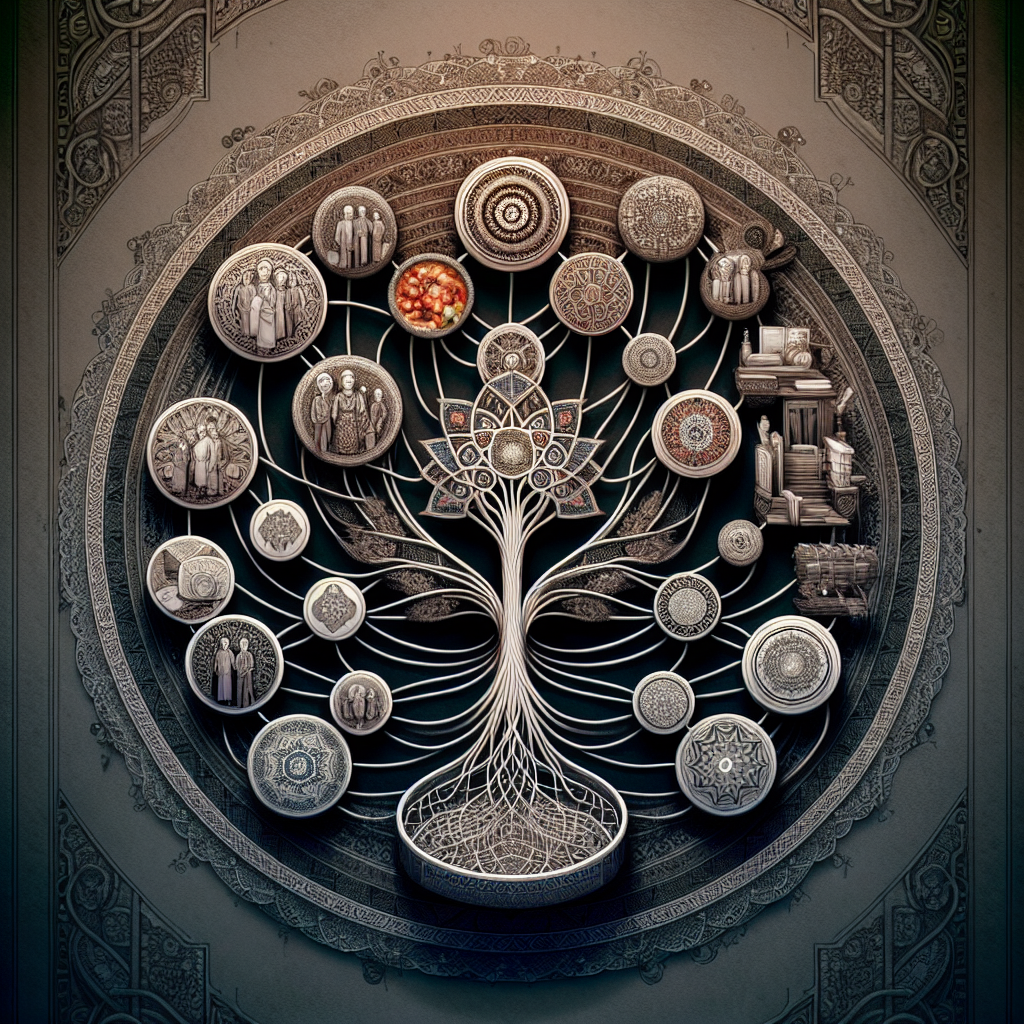Family Karma is a groundbreaking reality show on Bravo that offers viewers an intimate glimpse into the lives of first-generation Indian-American families residing in Miami. The show has not only entertained audiences but has also sparked discussions about cultural identity, family dynamics, and the experiences of immigrants. With a setting that juxtaposes the traditional values of the Indian diaspora with modern American life, Family Karma serves as a microcosm for understanding the complexities of cultural identity in a globalized world.
The Context of Family Karma
To comprehend the significance of Family Karma, it is essential to consider the context of the Indian-American experience. The Indian diaspora in America has roots that stretch back for over a century, but it gained notable recognition in the post-1965 immigration wave. Many came for higher education or professional opportunities, bringing with them rich cultural traditions and deep-seated family values.
The show is set against the vibrant backdrop of Miami, a city known for its multicultural population and dynamic lifestyle. Miami’s unique blend of cultures enhances the narrative, allowing the characters’ experiences to resonate with both the diasporic Indian community and the broader American audience.
Identity Conflict
One of the most poignant themes of the series is cultural identity, particularly the conflict between traditional Indian values and contemporary American lifestyles. The cast members navigate generational expectations, balancing their parents’ hopes against their aspirations. They often confront issues such as:
- Marriage and Relationships: Traditional beliefs about matchmaking and family honor.
- Career Choices: The pressure to pursue professions deemed respectable and successful.
- Social Integration: The struggle to fit into American society while maintaining cultural roots.
This ongoing tension between two worlds is a hallmark of the immigrant experience, and Family Karma captures this journey authentically, portraying the verbal and emotional clashes that arise as characters grapple with their identities.
Character Dynamics
The cast of Family Karma is a diverse group representing various personalities, backgrounds, and perspectives within the Indian-American community. Each character embodies a different aspect of cultural identity and provides viewers with insight into the multifaceted nature of their experiences.
Shivam and Vishal
Shivam and Vishal represent different approaches to assimilation. Shivam, who is more traditional in his approach, often feels the weight of familial expectations. In contrast, Vishal showcases a more liberal attitude toward dating and relationships – seeking to establish his individuality while still honoring his heritage.
Bali and Amrit
Bali and Amrit share a close, sibling-like bond which often results in humorous yet insightful interactions. Their relationship highlights the internal struggles faced by many young Indian-Americans, primarily when dealing with family obligations contrasting with personal goals.
Anisha
Anisha is an intriguing character who grapples with the balance between her fast-paced lifestyle and traditional family values. Her journey of self-discovery and the way she navigates her friendships provides a lens through which viewers can understand the evolving identity of young Indian women in America.
The Significance of Cultural Representation
The emergence of Family Karma signifies a turning tide in media representation, particularly concerning communities often underrepresented or misrepresented in mainstream media. By highlighting an Indian-American cast, the show facilitates discussions about cultural identity, social expectations, and generational challenges faced by multicultural families.
Media representation is critical not just for visibility but also for fostering understanding among audiences unfamiliar with differing cultural norms and practices. Family Karma’s portrayal encourages dialogue about:
- Stigma: Addressing stereotypes surrounding South Asian culture.
- Acceptance: Promoting acceptance and understanding of varied cultural practices.
- Family Values: Upholding the significance of familial ties within immigrant communities.
The Role of Tradition in Modern Culture
In Family Karma, traditions are portrayed not only as a source of pride but also as a source of conflict. Characters often experience tension between maintaining familial traditions and modern dating practices, thereby illuminating the delicate balance many first-generation individuals navigate:
- The importance of arranged marriages versus love marriages.
- Celebration of traditional festivals versus modern leisure activities.
- Conventional family roles versus emerging gender roles.
This complex interplay suggests that while traditions remain foundational to cultural identity, there is also a need for adaptability and evolution in the face of modern realities. The show intricately weaves these themes into its narrative, prompting viewers to reflect on their views about tradition and innovation.
Challenges Faced by Second-Generation Immigrants
Family Karma beautifully encapsulates the experience of second-generation immigrants, who often face unique challenges distinct from those encountered by their parents. These challenges can include:
- Balancing contradictory expectations from parents and societal peers.
- Struggling with cultural dissonance: feeling at home in America yet disconnected from Indian traditions.
- A constant search for identity that reconciles both backgrounds.
The Cultural Mosaic of Miami
The show’s setting in Miami, rich with cultural diversity, serves as both a backdrop and a character in itself. Miami is home to a multitude of cultural influences, from Latino to Caribbean, and this intersectionality enriches the show’s narrative.
The vibrant culture of Miami fosters a unique environment for the characters, allowing them to engage with and learn from other communities while grappling with their cultural identity. This multiculturalism often leads to fascinating interactions, as characters experience intersectional moments that challenge their preconceived notions about various communities.
The Impact of Family Karma on Cultural Awareness
Since its debut, Family Karma has increased awareness of the rich diversity within the South Asian community and has generated interest in Indian culture among a broader audience. By providing visibility to issues of race, culture, and identity, the show has sparked important conversations inclusive of:
- The significance of ethnic identity in American society.
- The evolving perspectives on familial duties and individualism.
- The acknowledgment of unique cultural narratives within the immigrant experience.
Some episodes draw direct connections to larger socio-political issues, compelling viewers to engage critically with the narratives while reflecting on their own cultural identities and histories.
Generational Expectations and Conflicts
Family Karma also sheds light on the varying expectations that cultural traditions impose on different generations. The first generation often holds onto traditions more fiercely, while the second generation may struggle to make sense of these customs in a contemporary context. This generational divide can lead to significant conflicts, represented in various ways:
- A clash of values: The traditional values parents cling to versus the modern outlooks of their children.
- Parental pressures surrounding career choices and relationship paths.
- Differences in perspectives regarding cultural traditions and their relevance today.
This conflict is notably illustrated through various familial interactions on the show, showcasing the emotional toll it can take on young adults trying to balance these expectations with their career ambitions and personal desires.
Relationship Dynamics
Romantic relationships are another focal point in Family Karma, serving as a conduit for exploring cultural conflict. Love interests often arise from varying backgrounds, leading to dynamic storylines, complicated love triangles, and dramatic turn of events.
Through the interactions between characters, Family Karma offers insights into how relationships within immigrant families often reflect larger cultural themes, including:
- Expectations of community approval in romantic partnerships.
- Struggles with acceptance from parents regarding interracial or intercultural relationships.
- The blending of cultural practices in relationship dynamics.
Redefining South Asian Narratives
Family Karma marks a significant shift in the portrayal of South Asian narratives in media. Historically, representation has often leaned towards caricatures or one-dimensional depictions of Indian culture, which do not account for its diversity and complexity. Family Karma goes beyond these stereotypes, showcasing nuanced characters and relatable stories that reflect real-life situations faced by many Indian-Americans.
This redefinition allows more individuals from similar backgrounds to see themselves reflected in media, fostering a sense of belonging while celebrating cultural uniqueness. It represents a step toward inclusivity and a deeper exploration of the South Asian narrative within the American social fabric.
Conclusion
Family Karma is not merely a reality show; it is a profound exploration of cultural identity that resonates with individuals across various backgrounds. By delving into the intricacies of immigrant life, generational conflicts, and the evolving American landscape, the series offers a meaningful commentary on the immigrant experience while celebrating the richness of Indian-American culture.
As the show continues to unfold, it opens the door for discussions about identity, representation, and recognition, serving as a catalyst for greater understanding in a rapidly changing world. The journey of each character provides insight into the broader cultural dynamics at play, making Family Karma a significant cultural artifact for both the Indian-American community and the viewing audience at large.
FAQs
What is Family Karma about?
Family Karma is a reality show that features the lives of first-generation Indian-American families living in Miami, exploring themes of cultural identity, family dynamics, and the immigrant experience.
Why is Family Karma significant for cultural representation?
The show highlights the unique experiences of Indian-Americans, showcasing the complexities of balancing traditional values with modern lifestyles, thereby challenging stereotypes and broadening representation in media.
How does Family Karma address generational conflicts?
Family Karma portrays the tension between the expectations of first-generation immigrant parents and the desires of their American-raised children, showcasing the often tumultuous interactions that arise from differing cultural values.
What themes are explored in Family Karma?
The show explores various themes including cultural identity, generational conflict, relationship dynamics, social integration, and the impact of societal expectations on individual choices.
Can Family Karma resonate with audiences outside the Indian-American community?
Yes, while the show specifically highlights the Indian-American experience, the universal themes of identity, family obligations, and cultural conflict can resonate with audiences from all backgrounds, fostering understanding and empathy.
It seems like you’re looking for a prompt, but I need a bit more context to assist you properly. Are you looking for writing prompts, art prompts, or something else entirely? Please provide some details so I can help you better!, #Understanding #Family #Karma #Deep #Dive #Cultural #Identity, #Understanding #Family #Karma #Deep #Dive #Cultural #Identity, 1734744178, understanding-family-karma-a-deep-dive-into-cultural-identity





